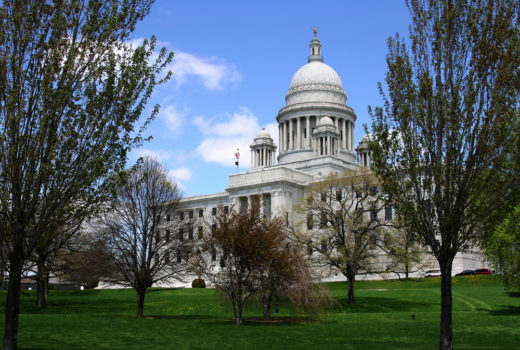 Across New England, the days are starting to get longer, everyone is hoping spring weather is just around the corner, and each state’s legislative session is firmly underway.
Across New England, the days are starting to get longer, everyone is hoping spring weather is just around the corner, and each state’s legislative session is firmly underway.
While it’s still relatively early in the current sessions, at NEBHE we’re taking a first look at the major issues and trends we see emerging in the region’s legislatures related to higher education and workforce development. Some topics are expected: affordability, student loan debt, and college closures / mergers / acquisitions / collaborations. Other bills touch on emerging issues: incentives for employers who provide and/or pay for employee training, and decreasing the cost of course materials and textbooks through the use of open educational resources.
2019 Legislative Session Schedule
State Convened Adjourns
Connecticut General Assembly…………… Jan. 9……….. June 5
Maine State Legislature………………… Dec. 5 (’18)…… June 19
Massachusetts General Court…………….. Jan. 2……….. Dec. 31
New Hampshire General Court………….. Jan. 2 ……. Late June
Rhode Island General Assembly…………. Jan. 1……… Mid-July
Vermont General Assembly……………….. Jan. 9……… Mid-May
Let’s take a deeper dive into what we see as the most significant issues to watch in 2019…
Affordability and Student Loan Debt
Every New England state has introduced legislation related to issues around college affordability and student loan debt.
Following what has quickly become a national trend, a number of new bills propose making higher education in New England free, tuition-free, or debt-free for various constituencies. Most notably, Rhode Island Gov. Gina Raimondo has proposed expanding the state’s Promise scholarship program to Rhode Island College to make the last two years of its four-year degree tuition-free. The proposal will need the legislature’s approval, but it faces stiff competition for funds from a suggested program for universal pre-kindergarten education, also put forth by Gov. Raimondo. This year Vermont also introduced a bill (S.38) that would create the Vermont Promise Scholarship Program to provide tuition-free scholarships to in-state students who attend a Vermont State College.
New Hampshire is seeking to tackle the issue of college affordability by incentivizing greater civic engagement. The General Court has submitted a bill (268-FN) that would provide in-state undergraduate tuition rates at any institution in the University System of New Hampshire (USNH) for any individual who can demonstrate that they are registered to vote in the state. The greatest roadblock this bill faces is that, if enacted, USNH would need to compensate for the resulting revenue shortfall. To do so, the bill proposes increasing tuition rates and/or decreasing institutional aid to the USNH’s 25,000 students — which may come close to nullifying any of the intended benefits with regard to offering in-state tuition.
Two states, Maine (S.P.285) and Massachusetts (HD.1069) have submitted proposals to establish a “Student Loan Bill of Rights” to provide borrowers with a minimum level of consumer protection and, in Maine’s case, to incentive college graduates to remain in-state post-graduation. The proposed Bill of Rights in Massachusetts had passed the state Senate unanimously in the 2018 session but is being reintroduced because it did not receive action in the House of Representatives. If passed in either state, Maine and/or Massachusetts would follow Connecticut, which enacted a Student Loan Bill of Rights in 2015. Similarly Rhode Island (S-0018) has submitted a resolution to request the creation of a working group to review make recommendation regarding how the state can better protect education loan borrowers.
Closures, Mergers, Acquisitions and Collaborations
Given the demographic headwinds New England’s postsecondary institutions are facing, it should come as no surprise that many state legislatures have introduced bills to tackle the growing problem of school closures, mergers, and acquisitions. In Massachusetts, Gov. Charlie Baker issued an emergency Senate bill (SD.2183) that, if passed, would require the Bay State’s degree-granting higher education institutions notify the Board of Higher Education of any financial liabilities or risks it faces, as well as a contingency closure plan. Connecticut has also proposed legislation (H.B.6474, S.B.749) that would prohibit the closure or merger of any of its public institutions of higher education without prior review and consent of the state’s General Assembly, while Connecticut State Colleges and Universities President Mark Ojakian continues to attempt to successfully consolidate all 12 community colleges into a single statewide college by 2023. Other states, such as Vermont, are beginning to consider ways to head off corollary issues at the pass by looking into potential solutions and best practices for handling student records after an institution’s closure, though no formal legislation has yet been filed.
Newly Emerging Issues
Beyond the two biggest topic areas above, other common issues are cropping up in states’ proposed legislation. Some of these include:
Employer tax credits for education loan assistance
Both Connecticut (S.B.435) and Massachusetts (S.1689) have introduced bills that would provide tax credits to employers that assist employees with their education loan payments.
Facilitation of affordable educational resources
Three states have pending legislation that falls under this umbrella: Connecticut, Maine, and Massachusetts. The bill in Maine (H.P.452) would award grants of at least $1,000 to low-income students to aid in the purchase of course textbooks. Connecticut (H.B.7162) and Massachusetts (H.1249) seek to mitigate the cost of course materials at higher education institutions by establishing special commissions to explore ways to improve the utilization of open educational resources (OERs) and other digital learning technologies.
You can view a round-up of all this session’s legislation pertaining to higher education and workforce development in the region here. NEBHE will continue to track these bills and provide regular updates on their progress, so stay tuned!
[ssba]
